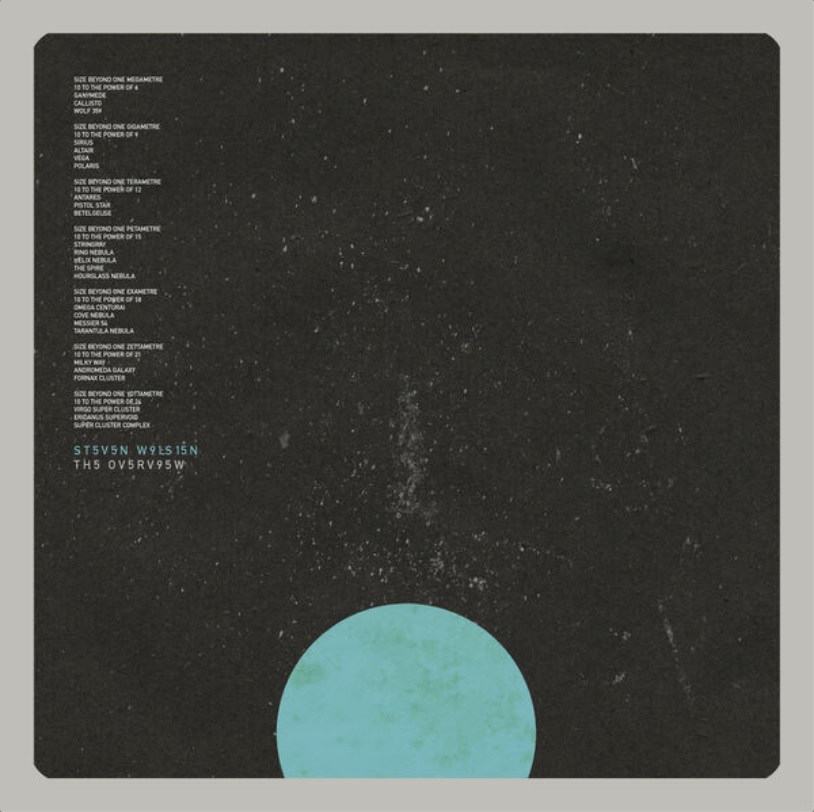His last two albums ' THE FUTURE BITES' from 2021 and 'The Harmony Codex' from 2023 took us into a modern, not to say contemporary, abundance bathed in electronic sounds and 'Steven Wilson' released an album about a month ago which, as we are now accustomed to, is the subject of numerous reviews in the specialized music press. It must be said that each new album from the British artist is the subject of numerous comments, as there is so much to say about what is offered to us. This time, we are taken into space, with 'The Overview' relating to what astronauts feel when they see Earth from space. So, does this latest studio recording (as always, with exceptional sound quality, ideal for listening on Qobuz with headphones!) continue this path of perpetual search for new musical horizons? I would answer both yes and no. Of course, everything I am about to write is subjective and reflects only my musical experience, which is necessarily based on the multitude of different listening sessions since the 1970s.
First of all, when I saw the cover, I already had the feeling of rediscovering the back of a vinyl record from the early days of progressive rock, the unadorned vintage feel taking us back to that period. Then the format of two long titles for each side of a record reminds me of the discovery in the 70s of the first 'Pink Floyd' with 'Meddle', 'Atom Heart Mother' and 'Wish You Were Here' whose main titles took up all the space on one of the sides of a microgroove. Furthermore, musically, even if the British continues his musical peregrinations with electro sounds, the sensations deployed in certain sections of the first long development brought me back to the first 'Floyds', precisely in 'The Buddha of the Modern Age' with this hammered song that denounces the actions of Man, treated as an inferior species, or in the final crescendo of 'The Cicerones/Ark' of the first long development that reminded me of 'Astronomy Domine' which was part of the cult album 'Ummagumma', a legendary album that, at the time, opened new musical horizons with this judicious mix between sound experiments and more conventional titles. For all these reasons, I would say that 'The Overview' draws some of its influences from the great tradition of progressive albums throughout the ages.
On the other hand, this opus cannot be summed up as a simple progressive album taking us back to the 70s because, as we are now accustomed to, there is always this search for new musical horizons and, from the outset, in 'Objects Outlive Us', which is made up of eight very distinct sections, we are caught by this ethereal song as if we were floating in weightlessness to accompany a space expedition, well imagining the theme of the album. We also find this mixture of different atmospheres within the compositions themselves, for example, 'Objects: Meanwhile' which begins with a catchy melody that can recall the first 'Blackfield' and which takes a completely different turn in the second part with a much more tormented section. With the instrumental 'Cosmic Sons of Toils', the atmosphere is more tormented and takes us into contemporary sounds similar to industrial metal to finally fall back into some atmospheric keyboard notes and, after all this accumulated tension, 'No Ghost on the Moor/Heat Death of the Universe' brings a beautiful opposition, all in relaxation, for a beautiful 'Floydian' finale, 'Randy Mcstine' laying down a magnificent guitar solo.
As for the second long development, 'The Overview', after the harsh criticisms of Man in 'Objects Outlive Us', we are taken on a meditative journey with much more electronic sounds (recalling his earlier wanderings in 'The Future Brites'), highlighting this cosmic side which takes us through the dizzying immensity of the universe and which begins with the enumeration of galaxies by 'Steven Wilson's' wife, 'Rotem Wilson'. Throughout this title, the peaceful 'Blackfieldian' atmospheres reappear with for example the very beautiful 'A Beautiful Infinity/Borrowed Atoms' which offers a slow tempo conducive to escape then, 'Infinity Measured in Moments' continues this moment suspended in time with another composition which begins calmly and which gradually gains momentum until the finale which highlights 'Theo Travis' on saxophone and 'Adam Holzman' on keyboards, on strong lyrics which put us back in our place in this gigantic universe in which we are only a tiny part, with the wish that it keeps this indelible trace of the furtive passage of this life on earth. And to finish our journey into this vast expanse of space, 'Permanence' concludes the album in a vaporous and ethereal atmosphere, like a 'Vangelis' with his two albums 'Rosetta' and 'Juno to Jupiter', the accompaniment of a few saxophone notes bringing a melancholic finale conducive to meditation.
In summary, the general impression that emerges from this album and that 'Steven Wilson' has put his talent of composer at the service of the theme, and not the other way around, to obtain, in the end, a homogeneous whole which fuses progressive influences between classicism and modernity, and which, like any album of this type, improves with each listen to become an essential album in the ideal record collection of any progressive music lover... | |



